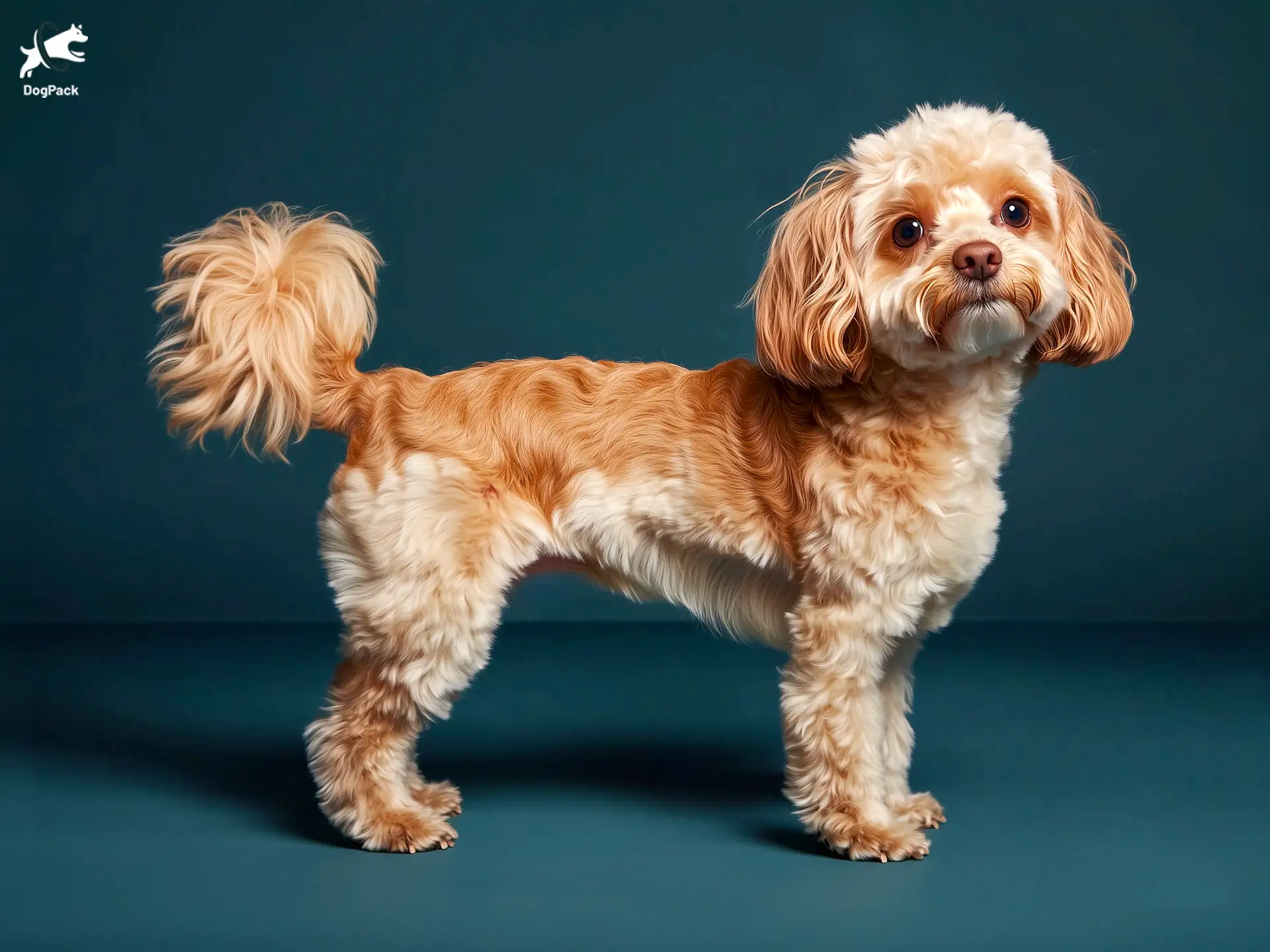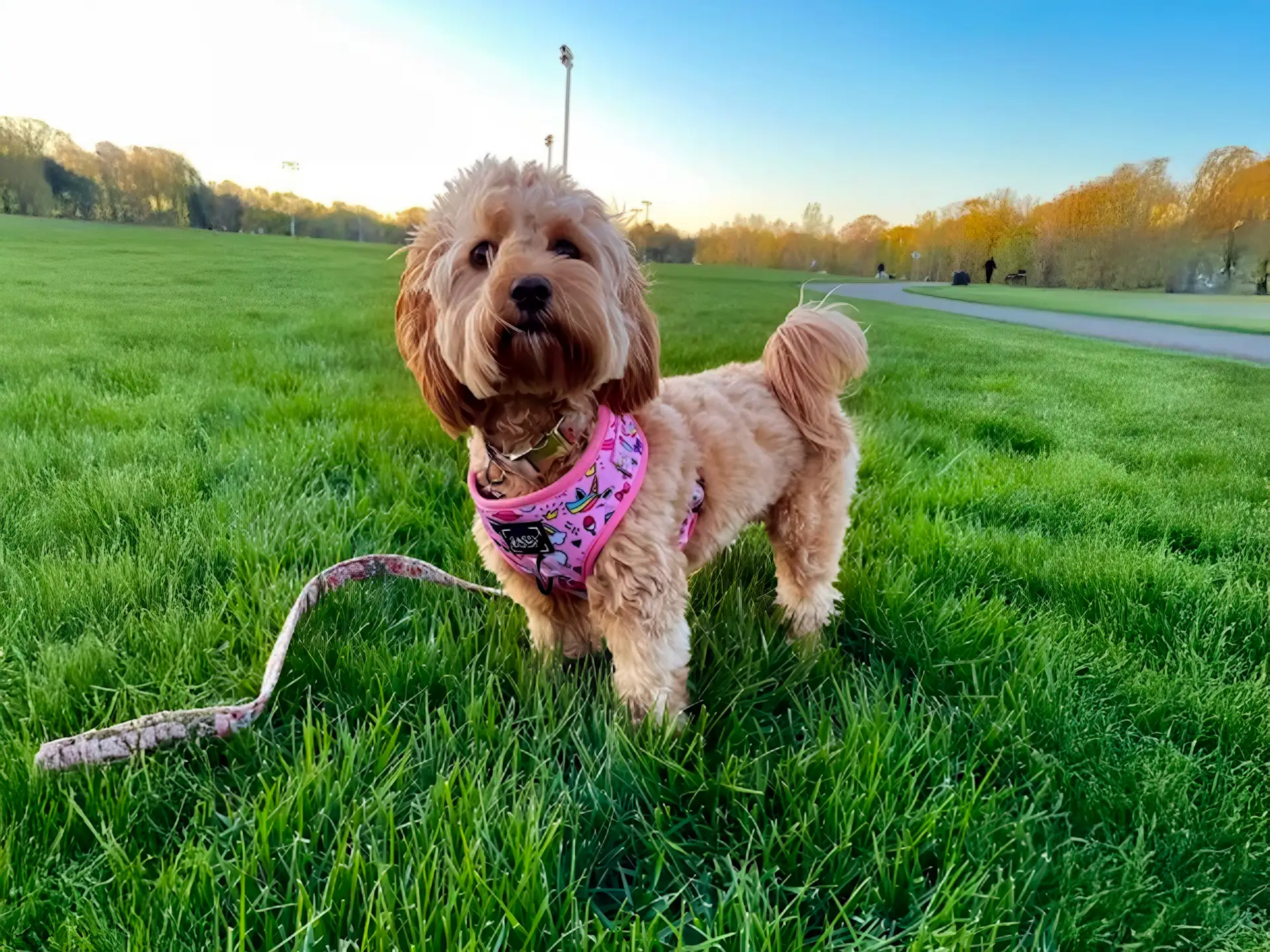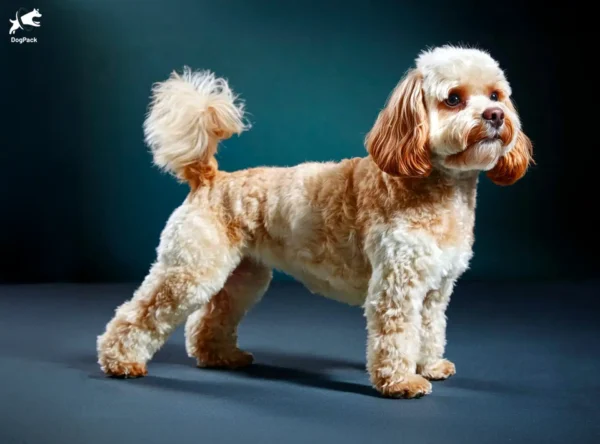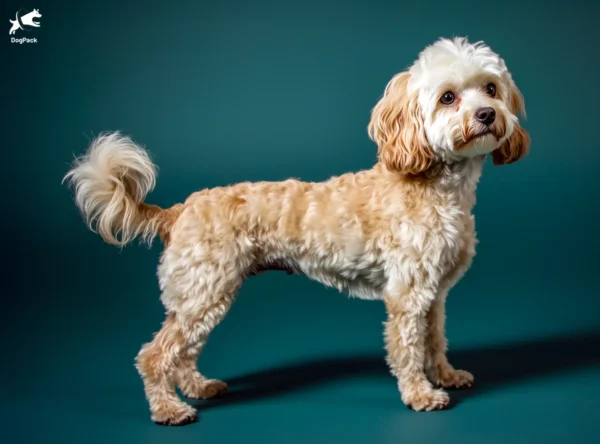Cavoodle Dog Breed Info & Overview
The Cavoodle, a charming mix of the Cavalier King Charles Spaniel and Poodle, combines cuddly sweetness with sharp intelligence. Known for their affectionate temperament and low-shedding coat, Cavoodles make ideal companions for families and singles alike. With their endearing personality and adaptability, it’s no wonder Cavoodles are capturing hearts worldwide, bringing joy and companionship to all.
Characteristics
Pictures
Breed History
The Cavoodle’s story begins in Australia during the late 1990s, when breeders sought to combine the gentle nature of the Cavalier King Charles Spaniel with the intelligence and low-shedding coat of the Poodle. This crossbreeding aimed to create a companion dog suitable for families and individuals with allergies.
Over the years, this delightful crossbreed has gained immense popularity not just in Australia but worldwide. Their adaptable size and friendly demeanor made them a hit among city dwellers and suburban families alike. The breed’s affectionate nature and low-maintenance coat were significant factors in their rising fame.
Although not recognized as a purebred by major kennel clubs, Cavoodles have found their way into the hearts of many dog lovers. Their name, a blend of “Cavalier” and “Poodle,” reflects their mixed heritage. Today, they continue to be a favorite choice for those seeking a loving and trainable companion.
Temperament, Personality
Cavoodles are known for their affectionate and friendly personalities. They thrive on human companionship and are happiest when they’re part of family activities. Their gentle nature makes them excellent companions for children and seniors alike.
Intelligence is another hallmark of this breed, inherited from their Poodle parentage. They’re quick learners and eager to please, which makes training a relatively smooth process. Early socialization is key to ensuring they grow into well-rounded adults.
Despite their friendly demeanor, Cavoodles may develop separation anxiety if left alone for extended periods. They crave interaction and can become distressed without adequate attention. Providing plenty of mental stimulation and affection helps keep them content.
Physical Characteristics
Cavoodles are small dogs with a sturdy build, typically weighing between 9 and 25 pounds (4–11 kg). Their height ranges from 9 to 14 inches (23–36 cm), making them a great size for apartment living or cozy homes.
Their coat can vary from wavy to curly, often reflecting the Poodle’s influence. Common coat colors include gold, caramel, black, and tri-color combinations. The low-shedding coat is a bonus for those concerned about allergies.
One of their most endearing features is their expressive eyes, which exude warmth and curiosity. Combined with their floppy ears and button nose, Cavoodles have an irresistible teddy bear appearance that melts hearts.
Health Issues
While generally healthy, Cavoodles can be prone to certain genetic health issues. Common concerns include hip dysplasia, progressive retinal atrophy, and heart conditions like mitral valve disease. Regular veterinary check-ups are essential for early detection.
Ear infections can also be an issue due to their floppy ears, which can trap moisture. Keeping their ears clean and dry helps prevent this. Dental health is another area to watch; regular teeth brushing can ward off periodontal disease.
To minimize health risks, it’s advisable to obtain your Cavoodle from a reputable breeder who conducts health screenings. Proper nutrition and regular exercise also play significant roles in maintaining their overall well-being.
Grooming Needs
Cavoodles have moderate grooming needs due to their wavy or curly coats. Regular brushing, at least two to three times a week, helps prevent matting and keeps their fur in top condition. A slicker brush or comb designed for curly coats works best.
Professional grooming every six to eight weeks is recommended to maintain their coat’s health and manage length. This is especially important if their coat leans more toward the Poodle’s curly texture, which can be prone to tangling.
Don’t forget routine care like nail trimming, teeth brushing, and ear cleaning. Their ears should be checked weekly for signs of infection or buildup. Regular grooming sessions also provide an opportunity to check for any skin issues or parasites.
Exercise Requirements
While Cavoodles enjoy playtime, they don’t require excessive exercise. A daily routine of 30 to 60 minutes of activity is sufficient to keep them happy and healthy. This can include walks, fetch games, or interactive play sessions in the backyard.
Their moderate energy levels make them adaptable to various living situations, including apartments. However, mental stimulation is just as important. Puzzle toys and training exercises can keep their intelligent minds engaged.
Remember, a bored Cavoodle can become mischievous. Regular exercise and mental challenges help prevent unwanted behaviors like chewing or excessive barking. It’s a great way to strengthen your bond with your furry friend.
Training Tips
Training a Cavoodle is generally a pleasant experience thanks to their eager-to-please attitude and intelligence. Positive reinforcement methods work best, using treats and praise to encourage good behavior. Consistency is key in reinforcing commands.
Early socialization is crucial. Exposing them to different environments, people, and other animals helps develop a well-adjusted adult dog. Puppy classes can provide structured socialization and basic obedience training.
Be mindful of their sensitive nature. Harsh training methods or punishment can lead to anxiety or fearfulness. Patience and gentle guidance will yield the best results, fostering a confident and happy Cavoodle.
Nutrition, Diet
Feeding your Cavoodle a balanced diet is essential for their health. High-quality dog food formulated for small breeds is recommended. Portion sizes typically range from 1 to 1.5 cups of dry food per day, split into two meals.
Due to their size and energy levels, monitoring calorie intake helps prevent obesity. Treats should be given sparingly and factored into their daily calorie count. Always provide access to fresh water.
Some Cavoodles may have food sensitivities or allergies. If you notice signs like itching or digestive issues, consult your veterinarian for dietary adjustments. Foods rich in omega fatty acids can promote a healthy coat and skin.
Adoption, Breeders
When looking to bring a Cavoodle into your home, consider adoption as a first option. Rescue organizations and shelters occasionally have Cavoodles in need of loving families. Websites like Petfinder can be a valuable resource.
If you opt for a breeder, ensure they are reputable and prioritize the health of their dogs. Ask for health clearances and visit the breeding facility if possible. The Cavapoo Owners Group can provide help, referrals and insights about this breed.
Avoid puppy mills or pet stores where breeding conditions may be poor. Responsible breeders will be transparent about health histories and willing to answer all your questions to ensure a good match.
Family Pet?
Cavoodles make excellent family pets due to their affectionate and gentle nature. They get along well with children and can adapt to households with other pets. Their small size and friendly disposition make them less intimidating to young kids.
Supervision is always recommended when small children interact with any dog to ensure safety for both parties. Teaching kids how to respectfully handle and engage with the Cavoodle fosters a positive relationship.
Their adaptable energy levels mean they can keep up with active families or enjoy a more relaxed lifestyle with seniors. The Cavoodle’s loving personality brings joy to households of all types.
Right For You?
If you’re seeking a loving, intelligent, and adaptable companion, the Cavoodle could be the perfect match. They’re suitable for first-time dog owners and fit well in various living environments, from apartments to larger homes.
Consider your availability to meet their social needs. Cavoodles thrive on interaction and may not do well if left alone frequently for long periods. They require moderate grooming and regular exercise to stay happy and healthy.
Ultimately, if you’re ready to provide love, attention, and care, a Cavoodle will reward you with unwavering affection and companionship. They’re a delightful addition to the right home.
Conclusion
In wrapping up, the Cavoodle is a charming and versatile breed that fits seamlessly into many lifestyles. Their affectionate nature, combined with intelligence and a low-shedding coat, makes them an ideal pet for families, singles, and seniors alike. If you’re ready for a loyal companion who’s eager to be your best friend, the Cavoodle might just be the perfect dog for you.
FAQs
-
Why are Cavoodles known as ideal family pets?
Cavoodles are affectionate, gentle, and social, making them ideal for families. Their Cavalier and Poodle heritage gives them a friendly nature, allowing them to bond easily with children and other pets.
-
Do Cavoodles require frequent grooming?
Yes, Cavoodles benefit from regular grooming due to their curly or wavy coat, which can mat if left unattended. Brushing a few times a week and professional grooming every 6–8 weeks keep their coat in top condition.
-
Are Cavoodles prone to any health issues?
Cavoodles may inherit health concerns common to Cavaliers and Poodles, such as ear infections and heart issues. Regular vet check-ups and a balanced diet help manage their health effectively.
-
How well do Cavoodles adapt to new environments?
Cavoodles are adaptable and can adjust well to various living environments. Whether in apartments or houses, they thrive with consistent exercise, mental stimulation, and family interaction.
-
What’s the difference between a Cavoodle and a Cavapoo?
The terms “Cavoodle” and “Cavapoo” refer to the same Cavalier King Charles Spaniel and Poodle mix. “Cavoodle” is popular in Australia, while “Cavapoo” is used in the U.S. and U.K. Both names describe a friendly, low-shedding companion with similar traits.
Breed Ratings
Cavoodles are highly intelligent, making training and learning new tricks a breeze.
They have a playful spirit but also appreciate downtime cuddling with their owners.
With moderate energy, they enjoy daily walks and play but aren’t overly demanding.
Low shedding makes them ideal for those who prefer a cleaner home.
Cavoodles have a low prey drive, getting along well with other small animals.
Regular grooming is needed to maintain their coat, but it’s manageable.
Their eagerness to please and intelligence make them highly trainable.
They prefer company and may become anxious if left alone too long.
Generally quiet, they may bark when excited or anxious.
Drooling is minimal, which is good news for tidy owners.
Cavoodles usually get along well with other dogs, especially when socialized early.
They are generally healthy but can be prone to certain genetic conditions.














